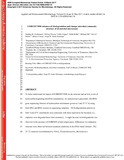JavaScript is disabled for your browser. Some features of this site may not work without it.
| dc.contributor.author | Techtmann, Stephen M. | |
| dc.contributor.author | Zhuang, Mobing | |
| dc.contributor.author | Campo, Pablo | |
| dc.contributor.author | Holder, Edith | |
| dc.contributor.author | Elk, Michael | |
| dc.contributor.author | Hazen, Terry C. | |
| dc.contributor.author | Conmy, Robyn | |
| dc.contributor.author | Santo Domingo, Jorge W. | |
| dc.date.accessioned | 2020-03-19T16:27:10Z | |
| dc.date.available | 2020-03-19T16:27:10Z | |
| dc.date.issued | 2017-03-10 | |
| dc.identifier.citation | Techtmann SM, Zhuang M, Campo P, et al., (2017) COREXIT 9500 enhances oil biodegradation and changes microbial community structure of oil-enriched microcosms, Applied and Environmental Microbiology, Volume 83, Issue 10, May 2017, Article number e03462-16 | en_UK |
| dc.identifier.issn | 0099-2240 | |
| dc.identifier.uri | https://doi.org/10.1128/AEM.03462-16 | |
| dc.identifier.uri | http://dspace.lib.cranfield.ac.uk/handle/1826/15314 | |
| dc.description.abstract | To better understand the impacts of Corexit 9500 on the structure and activity levels of hydrocarbon-degrading microbial communities, we analyzed next-generation 16S rRNA gene sequencing libraries of hydrocarbon enrichments grown at 5 and 25°C using both DNA and RNA extracts as the sequencing templates. Oil biodegradation patterns in both 5 and 25°C enrichments were consistent with those reported in the literature (i.e., aliphatics were degraded faster than aromatics). Slight increases in biodegradation were observed in the presence of Corexit at both temperatures. Differences in community structure were observed between treatment conditions in the DNA-based libraries. The 25°C consortia were dominated by Vibrio, Idiomarina, Marinobacter, Alcanivorax, and Thalassospira species, while the 5°C consortia were dominated by several species of the genera Flavobacterium, Alcanivorax, and Oleispira. Most of these genera have been linked to hydrocarbon degradation and have been observed after oil spills. Colwellia and Cycloclasticus, known aromatic degraders, were also found in these enrichments. The addition of Corexit did not have an effect on the active bacterial community structure of the 5°C consortia, while at 25°C, a decrease in the relative abundance of Marinobacter was observed. At 25°C, Thalassospira, Marinobacter, and Idiomarina were present at higher relative abundances in the RNA than DNA libraries, suggesting that they were active in degradation. Similarly, Oleispira was greatly stimulated by the addition of oil at 5°C. | en_UK |
| dc.language.iso | en | en_UK |
| dc.publisher | American Society for Microbiology | en_UK |
| dc.rights | Attribution-NonCommercial 4.0 International | * |
| dc.rights.uri | http://creativecommons.org/licenses/by-nc/4.0/ | * |
| dc.title | COREXIT 9500 enhances oil biodegradation and changes microbial community structure of oil-enriched microcosms | en_UK |
| dc.type | Article | en_UK |
| dc.identifier.cris | 17113292 |
Files in this item
The following license files are associated with this item:
This item appears in the following Collection(s)
-
Staff publications (SWEE) [2825]

